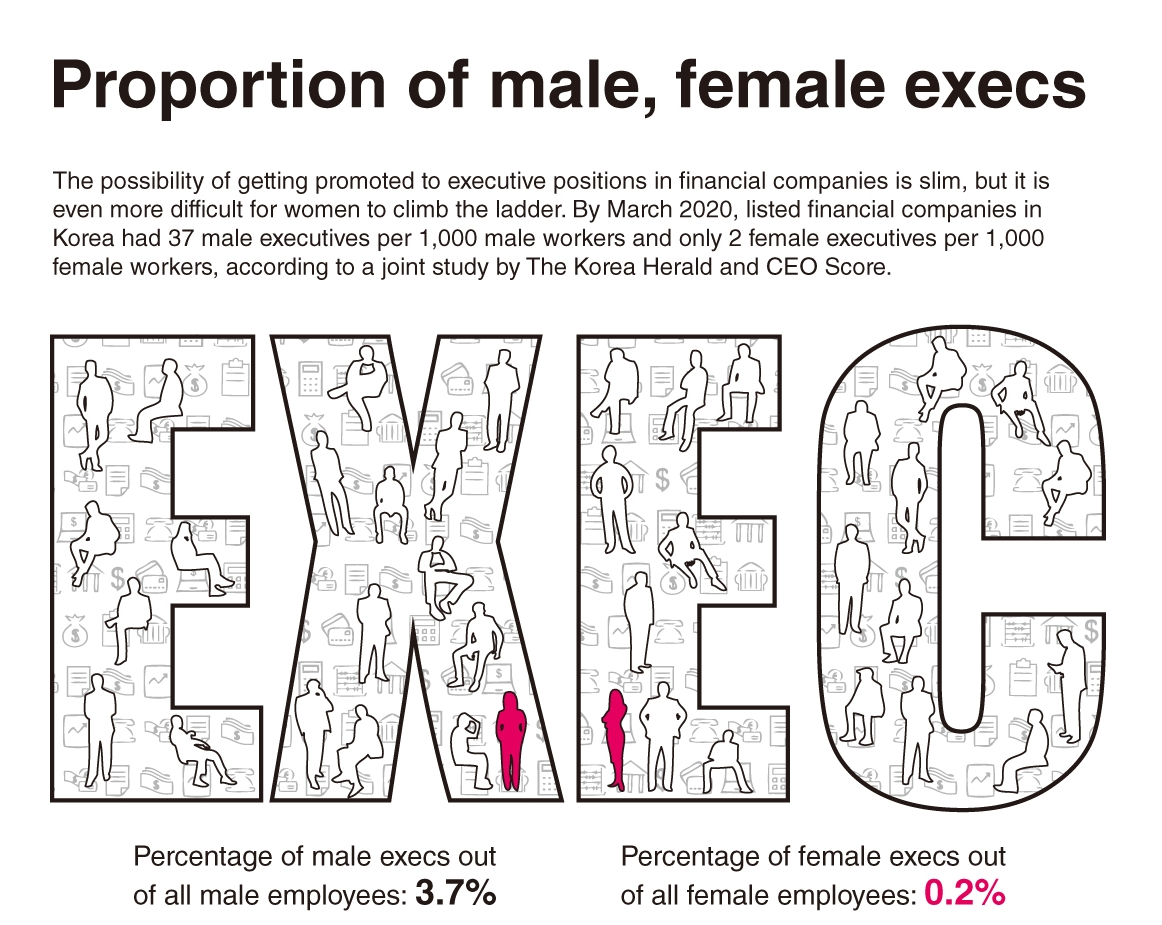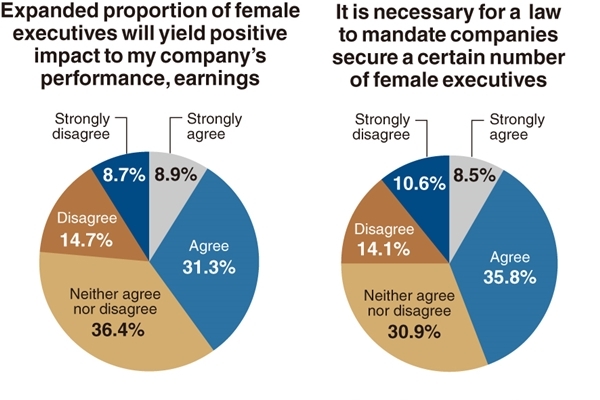[Women in Finance 3] Women who broke the glass ceiling
Top women financiers in Korea say concerted efforts needed from families, companies and society to create level playing field
By Kim Young-wonPublished : Dec. 13, 2020 - 18:15

The Korea Herald is publishing a series of special reports on the glass ceiling in the financial industry, focusing on South Korea’s market compared with other major economies. Funded by The Korea Press Foundation, the series will evaluate where Asia’s fourth-largest economy stands in terms of gender equality, will reflect on changes being made and will explore ways to boost inclusion in the sector. -- Ed.
Looking back at her 41-year career in South Korea’s finance sector, Sohn Byung-ok, former CEO of Prudential Life Insurance Korea, recalls how she struggled to strike the right balance between work and home.
Sohn, the first female financier here who made it all the way to the top, said it is never wise to be a superwoman and that she believes in excelling simultaneously at home and at work.
“You need to make wise choices and then prioritize things that you should focus on,” she said. “You need to seek your family’s understanding when you have projects to be done, and also (make clear) to the company that you have family matters to deal with. You need to have your voice heard from both sides.”
After starting her career with Chase Manhattan Bank in 1974, it took her nearly four decades to break the glass ceiling in the finance sector -- and more than 130 years since the country’s modern banking system was introduced in 1878.
Before 2011, the year Sohn was named CEO of the foreign insurance company, Korea had no female representation in the top ranks of finance in the private sector. Asia’s fourth-largest economy, which elected its first female president seven years ago, still has no women in public office supervising financial policies and regulating markets.
Sohn’s rise to the top led other women to follow suit.
The state-owned Industrial Bank of Korea named Kwon Seon-joo as the first female CEO in 2013, and Citibank Korea welcomed Yoo Myung-soon just last month. The list of female CEOs in finance also includes KB Securities CEO Park Jeong-rim, IBK Capital CEO Choi Hyun-sook and Cho Jee-eun, incoming CEO of Lina Life Insurance.
Looking back at her 41-year career in South Korea’s finance sector, Sohn Byung-ok, former CEO of Prudential Life Insurance Korea, recalls how she struggled to strike the right balance between work and home.
Sohn, the first female financier here who made it all the way to the top, said it is never wise to be a superwoman and that she believes in excelling simultaneously at home and at work.
“You need to make wise choices and then prioritize things that you should focus on,” she said. “You need to seek your family’s understanding when you have projects to be done, and also (make clear) to the company that you have family matters to deal with. You need to have your voice heard from both sides.”
After starting her career with Chase Manhattan Bank in 1974, it took her nearly four decades to break the glass ceiling in the finance sector -- and more than 130 years since the country’s modern banking system was introduced in 1878.
Before 2011, the year Sohn was named CEO of the foreign insurance company, Korea had no female representation in the top ranks of finance in the private sector. Asia’s fourth-largest economy, which elected its first female president seven years ago, still has no women in public office supervising financial policies and regulating markets.
Sohn’s rise to the top led other women to follow suit.
The state-owned Industrial Bank of Korea named Kwon Seon-joo as the first female CEO in 2013, and Citibank Korea welcomed Yoo Myung-soon just last month. The list of female CEOs in finance also includes KB Securities CEO Park Jeong-rim, IBK Capital CEO Choi Hyun-sook and Cho Jee-eun, incoming CEO of Lina Life Insurance.

The Bank of Korea has women on its monetary policy board.
Suh Young-kyung, former deputy governor of the central bank, was named as a board member in April. Now, for the first time in the bank’s 70-year history, it has more than one woman on the board. Lim Ji-won, managing director of investment bank JPMorgan Korea, has been a BOK monetary policy board member since 2018.
Their presence, perceived as quite significant, was still not enough to shake up the industry, which has long been considered a boys’ club.
The proportion of female executives among Korea’s financial companies was 4.1 percent as of March 2020, according to a joint study by The Korea Herald and corporate data research firm CEO Score. Women’s chances of getting promoted to executive positions in financial companies was also slim. While the companies had 37 executives for every 1,000 male workers, they had only 2 female executives per 1,000 women.
Untold stories
Scarce female representation in the industry today owes much to the corporate culture of the past, when men were considered the main breadwinners.
Suh Young-kyung, former deputy governor of the central bank, was named as a board member in April. Now, for the first time in the bank’s 70-year history, it has more than one woman on the board. Lim Ji-won, managing director of investment bank JPMorgan Korea, has been a BOK monetary policy board member since 2018.
Their presence, perceived as quite significant, was still not enough to shake up the industry, which has long been considered a boys’ club.
The proportion of female executives among Korea’s financial companies was 4.1 percent as of March 2020, according to a joint study by The Korea Herald and corporate data research firm CEO Score. Women’s chances of getting promoted to executive positions in financial companies was also slim. While the companies had 37 executives for every 1,000 male workers, they had only 2 female executives per 1,000 women.
Untold stories
Scarce female representation in the industry today owes much to the corporate culture of the past, when men were considered the main breadwinners.

Chai Hyun-joo, who became the first executive director of securities operator the Korea Exchange last year, said financial institutions have traditionally been “men-only” clubs even at the entry level.
“We had just a few women when I joined (the Korea Exchange) in 1991, and we were given back-office assignment such as typing and receiving telephone calls,” she said.
“It was the time when women building their careers was rare, and because of that sort of dominant perception, people from the Finance Ministry and brokerage companies were often reluctant to talk with me, and asked to switch their calls to male colleagues, implying that they don’t want to talk business with a woman.”
What Sohn and Chai had in common was not only the difficulty of balancing work and home life, but also surviving in the “gentlemen’s club” -- alone.
In contrast to their male colleagues, who often received helpful support and advice from their male superiors, the women fought obstacles to advance their careers, oftentimes on their own.
Since most of her colleagues were men, Sohn said she had to make extra efforts to keep “one step ahead” of her peers in terms of both work quality and quantity, adding that she studied for a master of business administration at night and additionally learned English and accounting.
Being nervous at work was an everyday affair.
“Wherever I go, I was the only woman on the team. … But because of that I was compelled to complete the job wishing to get assigned to key posts while being careful not to make trouble with male colleagues,” said Chai. “I was obsessed to work better, thinking that me doing my job well might open new opportunities to my (female) junior colleagues.”
Forget about glass ceiling
The financial sector still lags behind in achieving gender equality, and this could pose serious risks for individual businesses as well as the nation’s economy, according to experts.
“The issues regarding the lack of female leadership will likely get even worse if no effort is being made, and that is why the government has recently looked into the problems and revised a bill to require listed companies to have at least one woman on their director boards,” said Kim Woo-chan, a finance professor at Korea University Business School in Seoul.
“The fact that there are glass ceilings and discrimination for a particular gender means human resources are not efficiently utilized, which could undermine the nation’s overall competitiveness,” he added.
The newly revised bill, which went into effect in January this year, requires a listed company with 2 trillion won ($1.83 billion) in assets or more to have at least one female board member. After a grace period that runs through August 2022, some 150 listed companies meeting the criteria must have at least one female outside director in the boardroom.
“We had just a few women when I joined (the Korea Exchange) in 1991, and we were given back-office assignment such as typing and receiving telephone calls,” she said.
“It was the time when women building their careers was rare, and because of that sort of dominant perception, people from the Finance Ministry and brokerage companies were often reluctant to talk with me, and asked to switch their calls to male colleagues, implying that they don’t want to talk business with a woman.”
What Sohn and Chai had in common was not only the difficulty of balancing work and home life, but also surviving in the “gentlemen’s club” -- alone.
In contrast to their male colleagues, who often received helpful support and advice from their male superiors, the women fought obstacles to advance their careers, oftentimes on their own.
Since most of her colleagues were men, Sohn said she had to make extra efforts to keep “one step ahead” of her peers in terms of both work quality and quantity, adding that she studied for a master of business administration at night and additionally learned English and accounting.
Being nervous at work was an everyday affair.
“Wherever I go, I was the only woman on the team. … But because of that I was compelled to complete the job wishing to get assigned to key posts while being careful not to make trouble with male colleagues,” said Chai. “I was obsessed to work better, thinking that me doing my job well might open new opportunities to my (female) junior colleagues.”
Forget about glass ceiling
The financial sector still lags behind in achieving gender equality, and this could pose serious risks for individual businesses as well as the nation’s economy, according to experts.
“The issues regarding the lack of female leadership will likely get even worse if no effort is being made, and that is why the government has recently looked into the problems and revised a bill to require listed companies to have at least one woman on their director boards,” said Kim Woo-chan, a finance professor at Korea University Business School in Seoul.
“The fact that there are glass ceilings and discrimination for a particular gender means human resources are not efficiently utilized, which could undermine the nation’s overall competitiveness,” he added.
The newly revised bill, which went into effect in January this year, requires a listed company with 2 trillion won ($1.83 billion) in assets or more to have at least one female board member. After a grace period that runs through August 2022, some 150 listed companies meeting the criteria must have at least one female outside director in the boardroom.

According to The Korea Herald survey, 44.3 percent of the 517 respondents said there needs to be a law that mandates a company have a certain number of female executives. Women respondents were more supportive than men, with 57.5 percent of female respondents saying they agreed with the idea, while 30.3 percent of males agreed.
The study also suggested that female representation in top management could lead to improved business performance. Slightly more than 40 percent of survey participants said increased female representation would have a positive impact on their companies’ performance and earnings.
Despite the government’s drive for gender equality, an increase in the number of women across industries and a slow change in perceptions of gender roles, the glass ceiling still exists. But it is not unbreakable, as Sohn’s experience shows.
“A glass ceiling exists almost everywhere, and it was worse than now some years ago,” said Sohn, who now serves as an outside director of Standard Chartered Bank Korea.
“As the financial market now has some C-level figures, it is the time for women to stop moaning about the glass ceiling, and to start breaking the glass ceiling in their minds and do their utmost to excel at work,” she said.
By Kim Young-won & Jie Ye-eun (wone0102@heraldcorp.com) (yeeun@heraldcorp.com)
The study also suggested that female representation in top management could lead to improved business performance. Slightly more than 40 percent of survey participants said increased female representation would have a positive impact on their companies’ performance and earnings.
Despite the government’s drive for gender equality, an increase in the number of women across industries and a slow change in perceptions of gender roles, the glass ceiling still exists. But it is not unbreakable, as Sohn’s experience shows.
“A glass ceiling exists almost everywhere, and it was worse than now some years ago,” said Sohn, who now serves as an outside director of Standard Chartered Bank Korea.
“As the financial market now has some C-level figures, it is the time for women to stop moaning about the glass ceiling, and to start breaking the glass ceiling in their minds and do their utmost to excel at work,” she said.
By Kim Young-won & Jie Ye-eun (wone0102@heraldcorp.com) (yeeun@heraldcorp.com)


















![[Today’s K-pop] Treasure to publish magazine for debut anniversary](http://res.heraldm.com/phpwas/restmb_idxmake.php?idx=642&simg=/content/image/2024/07/26/20240726050551_0.jpg&u=)